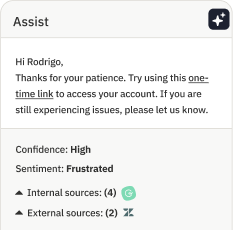In an AI-driven world, are soft skills even more important for CX teams?

At the beginning of a new year, I always like to step back and look at the big picture so I can plan and set clear goals. What does the CX landscape look like in 2024? What are the main trends that will impact CX this year?
The first one that comes to mind is Generative AI (GenAI). It's been a little over a year since OpenAI launched ChatGPT and released it to the world for all to be able to use. For CX, the promise of GenAI is a major boost of productivity: McKinsey and BCG estimate that GenAI could boost productivity in CX operations by a staggering 30% to 50%. CX leaders are trying to figure out their AI strategy, how it fits with the rest of their tech stack, and how it impacts their human teams.
At the same time, we're still navigating a chaotic and turbulent post-pandemic world. At an economic level, we’re seeing budget restrictions and layoffs. At a societal level, we are still dealing with burnout and adapting to remote work. CX teams are not immune to this trend and are feeling the squeeze between budget cuts and new workforce realities.
We are in a transformative era for CX, and some are even talking about a new technology revolution for CX. So, how do we adapt and thrive in this environment?
At Customer Service Lab (CS Lab), we're seeing a sudden increased demand for training CX teams, especially around soft skills. Although puzzling at first, I now see several reasons why it is happening:
- Soft skills training to rebuild a cohesive team: After years of multiple reorganizations, restructuring, and other pandemic-related changes (layoffs, budget cuts, etc) many CX teams are now composed of new team members with very little seniority. Institutional knowledge is gone and needs to be rebuilt. Some As CX leaders assess their CX maturity, some feel that it is time to implement or reinstitute standardized soft skills training so that everyone on the team is on the same page about core values, how to answer customers, and how to best represent the company brand — ultimately to help improve their overall CX maturity.
- More soft skills training for agents as AI handles basic cases: AI - especially GenAI - is rapidly enabling more efficiency, and some CX teams are already benefiting from it. However, while AI tackles easier cases, agents are faced with more complex or more demanding customer issues. This underscores the need for updated soft skills training, particularly as it relates to active listening, adaptability, problem-solving, (genuine) empathy, and conflict resolution.
- Soft skills training to upskill and prepare agents for a role beyond support: As the support agent’s role expands to use cases in Customer Success and Sales, there emerges a need to instill new soft skills, including communication skills, across the CX team. More and more, the agent's role is not just about answering support questions, but also about building a relationship by providing a proactive, white-glove service.
Since the launch of GenAI, there has been a lot of concern over how AI will impact jobs. For a more nuanced understanding of how things may change in the future, it’s important to think about jobs not as monolithic “jobs”, but instead as a collection of tasks. In other words, AI will replace some CX tasks while augmenting others, and in some cases, may not have any impact at all. Overall, I see our roles in CX meaningfully evolving with AI; the routine and repetitive will be automated, while other tasks will either be augmented or untouched. I encourage CX leaders to read the white paper, Jobs of Tomorrow: Large Language Models and Jobs by the World Economic Forum, published in September 2023. Their research shows that "tasks with the highest potential for automation by GenAI tend to be routine and repetitive, while those with the highest potential for augmentation require abstract reasoning and problem-solving skills. Tasks with lower potential for exposure require a high degree of personal interaction and collaboration". Problem-solving, collaboration, and how to manage personal interaction – these are the soft skills that will remain critical to any role in CX.
More studies show that GenAI makes soft skills more important and more valued in the workplace. Recent articles from Fast Company and the World Economic Forum both reference Professor Peter Gardon's 2023 research, "Competencies Needed by Business Professionals in the Age of AI: Character and Communication Lead the Way". He suggests that as workers and businesses scramble to stay competitive, employees and companies should also prioritize developing soft skills, especially around ethics and interpersonal communication, rather than focusing only on beefing up their technical skills. This shifting importance to soft skills was also confirmed in the latest findings from ISACA's State of Cybersecurity for 2023.
Interpersonal communication is at the heart of CX. It’s the superpower we use to build lasting relationships with customers and set our businesses apart from the competition. Integrity, honesty, and ethics are also fundamental skills we need to create a trusting, authentic environment for our customers.
In a world where we increasingly depend on technology/AI to connect, interact, and get work done, genuine human relationships are still hugely valuable. My advice to CX leaders, especially those feeling the pressure to catch up on GenAI and/or to reduce operational costs, is to remain focused on developing soft skills in your employees. After all, when GenAI becomes the new normal, what's going to set you apart from your competition isn't the technology, but your people.
Soft skills are what still make us uniquely human.
Sophie Conti is the Founder and CEO of CS Lab, a full service consultancy helping CX teams scale, evolve, and thrive in the changing landscape. Get in touch with them to learn more about how they supercharge soft skills for support teams everywhere.





